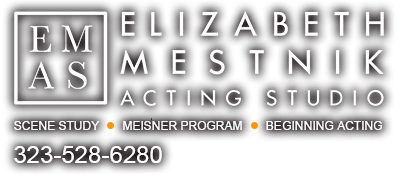2nd Year Instructor Ken Weiner reflects on his journey with
The Meisner Technique

Twenty years ago I hopped in my car and sped away from LA across
country to New Jersey to study with William Esper at Rutgers University.
The three following years of conservatory were so dense with experience,
learning and hair-pulling that I still believe no matter how busy, tired or
burnt I am; I survived Rutgers, I will make it through the day.
I went there to study Meisner. I loved the performing arts, the theatre
and acting. I would be a performing artist until the day I die and I didn’t
want to “guess” anymore. I didn’t want to rely on passion or luck. I wanted
technique and principles I could count on that would help me work the ‘right
way’ for the rest of my life.
Bill Esper and Maggie Flanigan taught with such conviction and
authority I swore, “I will never teach this. Not if I live to 103 will I be able
to teach this.”
I was there to become an artist not a teacher.
One of my peers was a young, thoughtful actress named Elizabeth
Mestnik. She was the first student to “come to life” during an exercise. We
stared with head-nodding revelation as Maggie turned to us and said, “That’s
coming to life!” Now it was up to us to follow in Elizabeth’s footsteps.
Sixteen years later, Elizabeth asked me if I would co-teach her
nd year Meisner class. Two decades later, I still feared being a teacher.
2
Thankfully I agreed and am now in my 5th year teaching at EMAS.
The principles behind Meisner’s work are simple. To mention a few –
the actor must be in contact with their partner, be emotionally related to the
circumstance, be living/doing truthfully through the imaginary
circumstances of the play. Sounds easy, right? Ah…now try it.
As an actor I always sought to simplify and demystify the work.
Acting and performance is a powerful and often enigmatic experience
but the act and process of creativity should be crystal clear. Every time I
work in the studio I search for the simplest way to educate and encourage
the students. What worked? What didn’t? What was unclear? And most
importantly, how do they fix it?
Because I act and I audition (which is what an actor does much of the
time) teaching reminds me what the actor must DO to create truthful and
authentic behavior.
I think of myself as an actor as I sit behind that exalted desk in class.
If I were onstage how would I approach this scene, this moment, this
circumstance? It’s my job to make you better. If you have no talent, no
commitment, no instincts you would not be in my class. Teaching is a way
of staying close to the “work” I am still so in awe of. It’s a way of
reminding myself everyday of the principles and technique that lead to
brilliance, transformation and truth.
If I can make your work better, I have made your life better.
I am not 107 years old. My middle name is not “Master”. I cannot
walk across rice paper like a Kung Fu prodigy. But I studied this work 20
years ago, I practice it daily and I still fight to emulate Elizabeth’s grasp of
the work just like I did twenty years ago when she was the first one to bust
down the walls that protect us and get to the truth, the heart, the soul of
being an artist.


